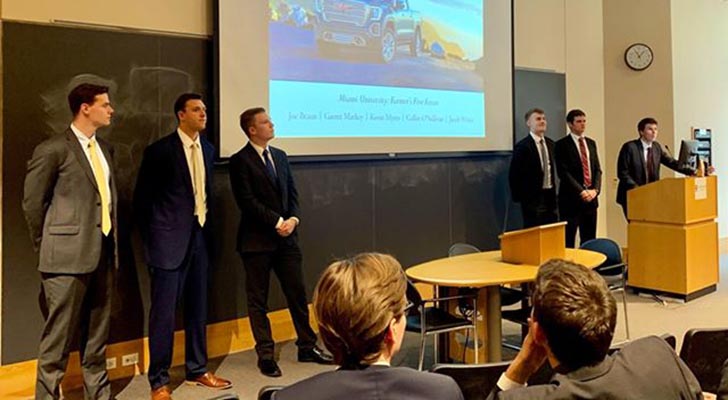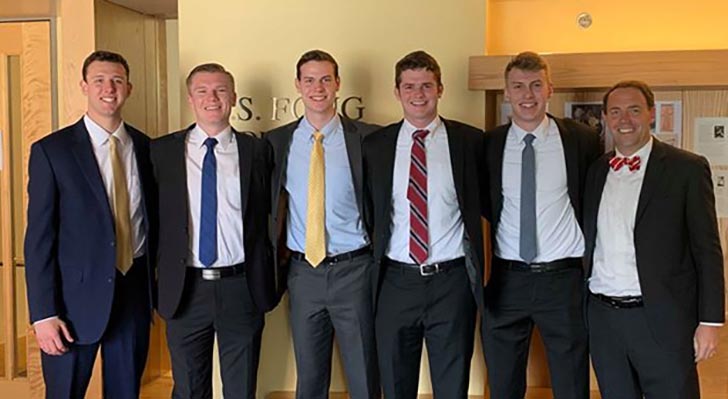Farmer School team makes finals of Global Case Competition at Harvard again
Team was one of only two U.S. teams to make finals


Team was one of only two U.S. teams to make finals
For the second time in as many years, a team of Farmer School students bested more than 100 undergraduate and graduate school teams from around the world to make the finals of the Global Case Competition at Harvard. Even more impressive, juniors Joe Braun, Collin O’Sullivan, Jake White, Kevin Myers, and Garret Markey were one of only two U.S. teams invited to Boston to present their case.
“I think it’s an honor to be on the same stage as some of those people that have more work experience, or perhaps have even gotten their MBA and now this is perhaps their capstone,” Markey said. “I think it really shows how much passion we have for this field of work and how much time and effort we’re willing to put in to produce a great product.”
The competition had teams looking at whether General Motors should acquire Tesla. “We found that Tesla wasn't the perfect company for that pitch,” Myers explained. “So we tried to find alternative investments and through a group effort, we were able to land on a company we were really confident in, which was Nio, a Chinese electric car manufacturer that just went public in September.”
Markey, Braun, and White were members of last year’s team that placed second in the finals, first among undergraduate teams. Braun said that experience helped prepare them for this year’s event. “I think that we had a really great pitch last year and obviously there our performance validated that, but this year, we had experienced it, knew what the judges would ask. We knew a little bit about what they were looking for from a rubric or a grading standpoint,” Braun explained. “We were able to take a step back from a 10,000 foot view and say, ‘Here's our solution. How are the judges going to view this? Not only from a financial perspective but also from the qualitative standpoint. How are they going to view this story and how are we really going to sell it to them?’ And so for us, I think that was the big differentiator when we looked at it this year.”
“This is an investment banking case competition, but obviously a lot goes into an acquisition. On our team, we had numerous industries covered. We have two guys go into a middle market bank in Chicago for investment banking, both in different sectors. We have an individual going into a middle market bank in Cleveland in different sectors. We have someone doing equity research and then someone else will do M&A consulting,” O’Sullivan explained. “So I think that was really beneficial in this case. Something that can be overlooked sometimes is that we each brought something different to the table and that really allowed us to do well and trust each other's work when putting together this case.”
The team members said they received a lot of help from the Farmer School’s Dr. David Shrider and Jan Taylor, who assisted them in tweaking their presentation for time and content. “That was something they didn't really have to be involved with and they did a really nice job of helping us with,” O’Sullivan pointed out. “I think that says a lot about the professors in the Farmer School of Business that they're willing to help you with those experiential learning opportunities.”
Though they didn’t win a spot among the top finishers this year, Myers noted that experience as a whole was still valuable. “I think we were all really proud of the product we put in. And although we didn't get the placing that we really worked for, I think that when you look back on it, you're seeing men and women who were five years older who have had more exposure in the industry, and we really went toe to toe with them throughout the competition,” he said. “That we really held our own is a testament to the team in this room and the education we've had here.”


